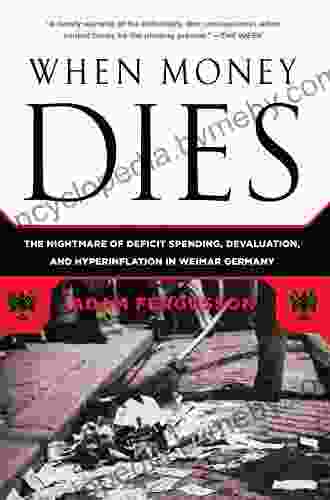Unveiling the Nightmare of Weimar: Deficit Spending, Devaluation, and Hyperinflation

The Weimar Republic, a short-lived era in German history from 1919 to 1933, serves as a stark cautionary tale of economic mismanagement and its catastrophic consequences.
In the aftermath of World War I, Germany faced immense reparations payments and an economy in shambles. The Weimar government resorted to deficit spending—borrowing heavily to finance its expenditures—to stimulate economic recovery.
4.4 out of 5
| Language | : | English |
| File size | : | 1701 KB |
| Text-to-Speech | : | Enabled |
| Enhanced typesetting | : | Enabled |
| X-Ray | : | Enabled |
| Word Wise | : | Enabled |
| Print length | : | 289 pages |
| Screen Reader | : | Supported |
Deficit Spending: A Slippery Slope
Deficit spending, when used judiciously, can provide a temporary boost to the economy. However, in Weimar Germany, it became a vicious cycle that spiraled out of control.
As the government continued to print money to cover its debts, the value of the German mark plummeted. Currency devaluation led to rising prices and a loss of purchasing power for citizens, fueling social unrest and political instability.
Hyperinflation: A Monetary Catastrophe
By 1923, Germany had descended into the abyss of hyperinflation, where prices skyrocketed at an astronomical rate. The value of the mark became virtually worthless, rendering savings and investments meaningless.
People resorted to bartering goods and services as money became obsolete. The economic chaos created widespread misery and poverty, eroding trust in the government and the stability of the nation.
Historical Lessons and Parallels
The economic turmoil of Weimar Germany provides valuable lessons for policymakers and citizens alike.
- Deficit spending should be used cautiously and only as a temporary measure to address economic downturns.
- Currency devaluation has severe consequences and can lead to hyperinflation, destroying the value of savings and investments.
- Central banks play a crucial role in managing inflation and maintaining the stability of the monetary system.
- Economic mismanagement can have far-reaching social and political consequences, undermining public trust and creating fertile ground for extremism.
Today, as we witness rising inflation and concerns about government debt levels, it is imperative to heed the lessons of Weimar Germany.
While the current economic situation may not be as dire as that of Weimar, responsible fiscal and monetary policies are essential to prevent a similar catastrophe.
The Nightmare of Deficit Spending, Devaluation, and Hyperinflation in Weimar is a chilling reminder of the dangers of economic mismanagement. By understanding the historical lessons of this period, we can avoid the mistakes of the past and safeguard the economic well-being of future generations.
It is through a collective commitment to prudent fiscal and monetary policies that we can ensure economic prosperity and stability, protecting against the nightmare that befell Weimar Germany.
4.4 out of 5
| Language | : | English |
| File size | : | 1701 KB |
| Text-to-Speech | : | Enabled |
| Enhanced typesetting | : | Enabled |
| X-Ray | : | Enabled |
| Word Wise | : | Enabled |
| Print length | : | 289 pages |
| Screen Reader | : | Supported |
Do you want to contribute by writing guest posts on this blog?
Please contact us and send us a resume of previous articles that you have written.
 Book
Book Novel
Novel Page
Page Chapter
Chapter Text
Text Story
Story Genre
Genre Reader
Reader Library
Library Paperback
Paperback E-book
E-book Magazine
Magazine Newspaper
Newspaper Paragraph
Paragraph Sentence
Sentence Bookmark
Bookmark Shelf
Shelf Glossary
Glossary Bibliography
Bibliography Foreword
Foreword Preface
Preface Synopsis
Synopsis Annotation
Annotation Footnote
Footnote Manuscript
Manuscript Scroll
Scroll Codex
Codex Tome
Tome Bestseller
Bestseller Classics
Classics Library card
Library card Narrative
Narrative Biography
Biography Autobiography
Autobiography Memoir
Memoir Reference
Reference Encyclopedia
Encyclopedia Tommy Hicks
Tommy Hicks Lisa Clegg
Lisa Clegg Abraham Grams
Abraham Grams A Christine Harris
A Christine Harris Carole Jackson
Carole Jackson J C Martin
J C Martin April Vollmer
April Vollmer Adam Makos
Adam Makos Jasmine Shao
Jasmine Shao Abraham Lincoln
Abraham Lincoln Aaron Guilmette
Aaron Guilmette Dr Parag Suresh Mahajan Md
Dr Parag Suresh Mahajan Md Daniel J Velleman
Daniel J Velleman Abe Streep
Abe Streep Alan I Marcus
Alan I Marcus Richard A Horsley
Richard A Horsley Aaron Muller
Aaron Muller S Allen Counter
S Allen Counter Ben Stein
Ben Stein Abhishek Singh
Abhishek Singh
Light bulbAdvertise smarter! Our strategic ad space ensures maximum exposure. Reserve your spot today!

 Salman RushdieEssays in Honor of Lloyd Shapley: A Legacy of Game Theory and Economic Design
Salman RushdieEssays in Honor of Lloyd Shapley: A Legacy of Game Theory and Economic Design
 Gabriel HayesDiscover the Gateway to Numerical Simulations: A Comprehensive Exploration...
Gabriel HayesDiscover the Gateway to Numerical Simulations: A Comprehensive Exploration... Ian PowellFollow ·10.8k
Ian PowellFollow ·10.8k Scott ParkerFollow ·10.7k
Scott ParkerFollow ·10.7k Walter SimmonsFollow ·10.8k
Walter SimmonsFollow ·10.8k Galen PowellFollow ·10.2k
Galen PowellFollow ·10.2k Devon MitchellFollow ·9.2k
Devon MitchellFollow ·9.2k Avery SimmonsFollow ·7.2k
Avery SimmonsFollow ·7.2k Andy ColeFollow ·17.2k
Andy ColeFollow ·17.2k Jon ReedFollow ·5.4k
Jon ReedFollow ·5.4k

 Timothy Ward
Timothy WardFearless Painting for True Beginners: Learn to Create...
Unlock the Joy of...

 Fernando Pessoa
Fernando PessoaProven 12-Step Program for Financial Peace of Mind:...
Are you struggling with...

 Chinua Achebe
Chinua AchebeLayers Colors Desire: Layers Colors Thoughts Mystery
A Literary Labyrinth...

 Fernando Bell
Fernando BellUnearth Hidden Treasures: Journey Through "Secondhand...
Prepare to embark on an extraordinary...

 Caleb Carter
Caleb CarterSymbolic Messages Garage Sale Mysteries: Unveiling the...
Welcome to the extraordinary world of the...

 Nikolai Gogol
Nikolai GogolTravels in the Billion Dollar Trash Trade: Uncovering the...
Ỡ In his...
4.4 out of 5
| Language | : | English |
| File size | : | 1701 KB |
| Text-to-Speech | : | Enabled |
| Enhanced typesetting | : | Enabled |
| X-Ray | : | Enabled |
| Word Wise | : | Enabled |
| Print length | : | 289 pages |
| Screen Reader | : | Supported |








